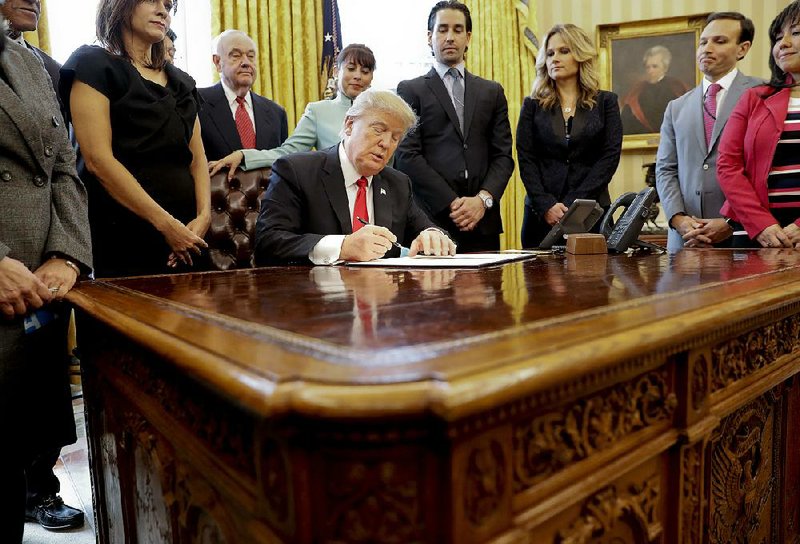WASHINGTON -- President Donald Trump signed an order Monday aimed at cutting regulations on businesses, saying agencies should eliminate two regulations for every new one.
The White House later released the text of the order, which added that the cost of any new regulation should be offset by eliminating regulations with the same costs to businesses. It excluded regulations regarding the military.
The order could be difficult to implement under current law, experts said, and would concentrate greater power in the Office of Management and Budget, which already reviews federal regulations.
Trump signed the document -- which he called "a big one" -- at his desk in the Oval Office surrounded by nine small-business owners who earlier in the morning met in the Roosevelt Room.
[PRESIDENT TRUMP: Details on administration, previous coverage, photos, videos]
"This will be the largest ever cut by far in terms of regulations," Trump said. "If you have a regulation you want, number one, we're not going to approve it, because it's already been approved probably in 17 different forms. But if we do, the only way you have a chance is we have to knock out two regulations for every new regulation. So if there's a new regulation they have to knock out two. But it goes way beyond that."
But experts on government policy were critical of the proposal.
"There's no logic to this," William Gale, a tax and fiscal policy expert at the Brookings Institution, said before seeing the executive order. "The number of regulations is not the key. It's how onerous regulations are. This seems like a totally nonsensical constraint to me."
Trump said the move would help both large and small businesses.
"Regulation has been horrible for big business, but it's been worse for small business," he said, noting that small businesses cannot hire the talent and compliance personnel that larger businesses do.
"There will be regulation, there will be control, but it will be a normalized control where you can open your business and expand your business very easily, and that's what our country has been all about," Trump said.
Administration members who attended the signing included White House counsel Donald McGahn; Chief of Staff Reince Priebus; Jared Kushner, Trump's son-in-law and senior adviser; domestic policy Director Andrew Bremberg; and National Economic Council Director Gary Cohn.
Also Monday, Trump reiterated his intention to roll back Dodd-Frank financial regulations enacted in response to the 2008-09 recession, telling reporters that he soon planned to "do a big number" on the 2010 law.
During the 2016 campaign, Trump pledged to "dismantle" Dodd-Frank, passed when Democrats controlled the White House and Congress. Trump has not announced his timetable for carrying through on that pledge as president.
Trump's pick for secretary of the Treasury, Stephen Mnuchin, a hedge fund manager, also has promised to "kill" parts of the law, including the so-called Volcker rule that restricts banks from making speculative investments similar to the ones that financial experts say helped lead to the 2008-09 global economic crisis.
"Dodd-Frank is a disaster," the president said during a 10-minute session with reporters as he signed the executive order on government regulations.
"We're going to be doing a big number on Dodd-Frank," Trump said. "The American dream is back."
Before meeting with business leaders late Monday morning, Trump said "a lot of the really smart people" bought stocks when he was elected, adding, "Big businesses are thrilled with what's happening. The stock market has gone up massively since the election."
One key section of Dodd-Frank is the requirement that banks undergo periodic stress tests to monitor liquidity and their ability to withstand a financial shock akin to the collapse of the housing market in 2008.
In response to the law, banks have curbed parts of their businesses, including proprietary trading, and focused more on raising revenue through consumer services.
The financial services industry spent millions seeking to prevent Dodd-Frank from going into effect, but some in the industry have cautioned that scrapping it completely could create new upheaval.
"We're not asking for wholesale throwing out Dodd-Frank," Jamie Dimon, the chief executive officer of JPMorgan Chase & Co., said at a financial services conference in December.
Information for this article was contributed by Steven Mufson of The Washington Post and by Glenn Thrush of The New York Times.
A Section on 01/31/2017

